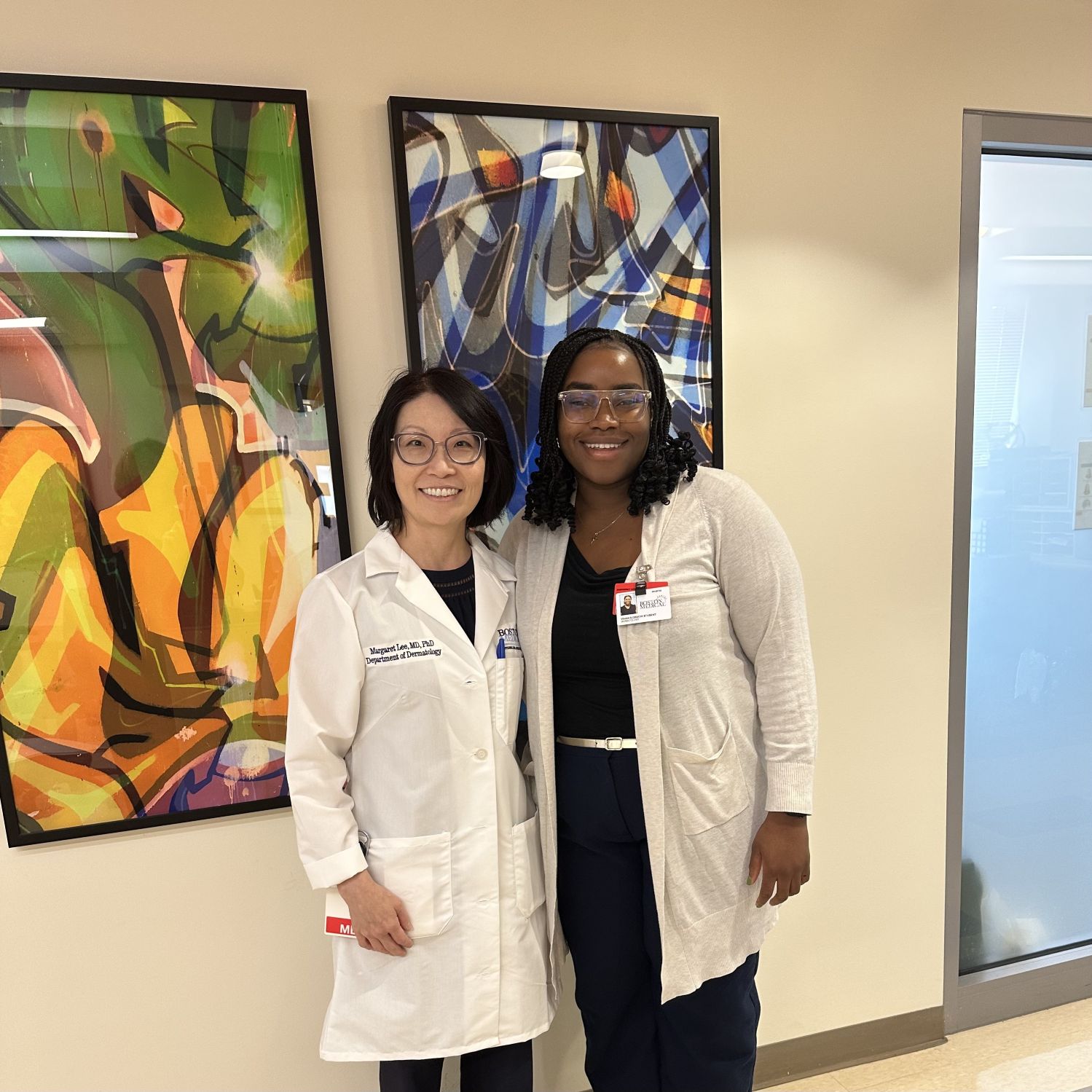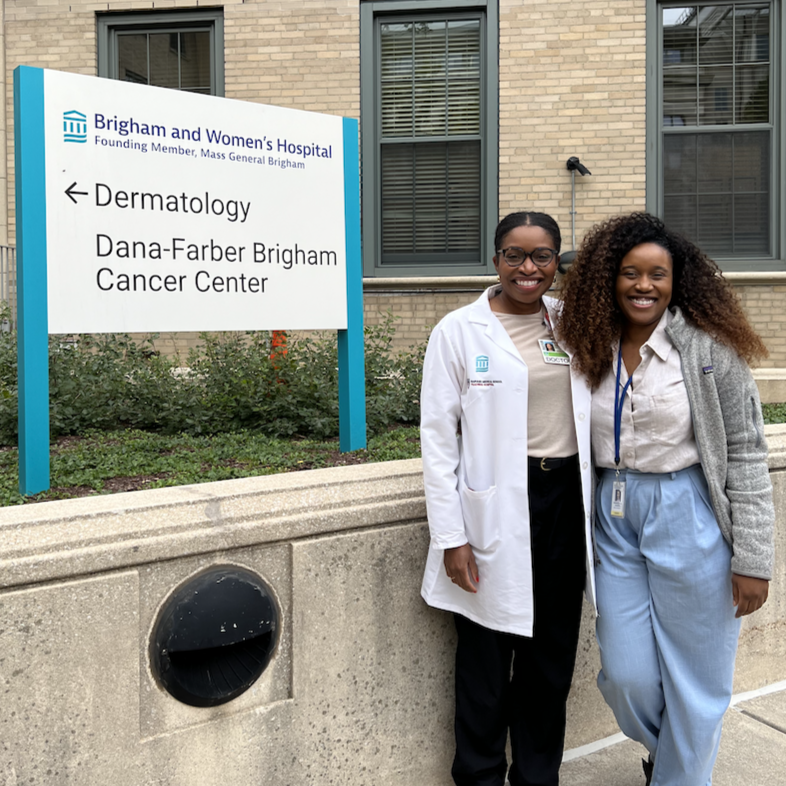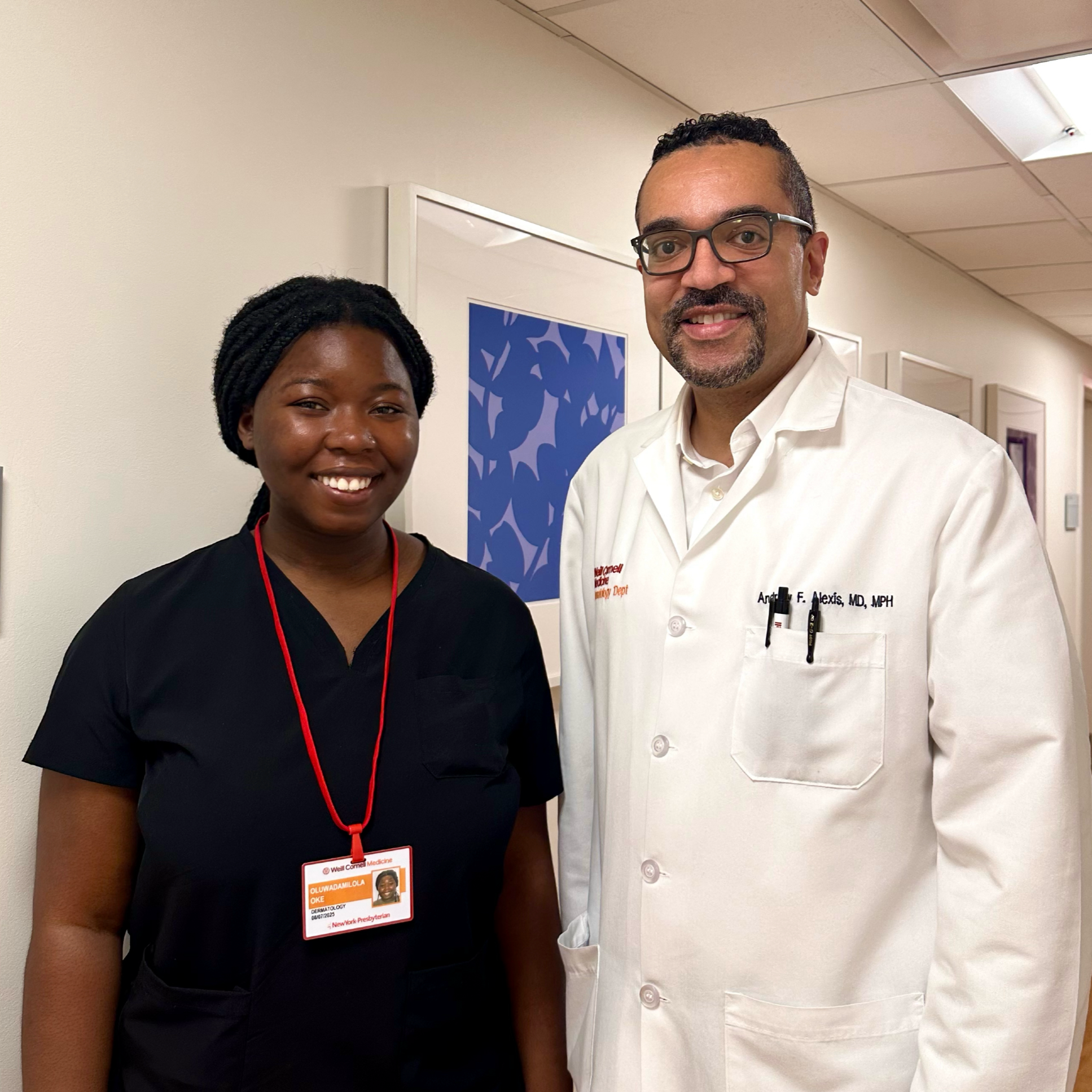
Mentee: Vivian Iloabuchi
Mentor: Margaret Lee
Department of Dermatology at Boston Medical Center
Experience at BMC through SOCS Observership Grant
My time rotating through the Department of Dermatology at Boston Medical Center (BMC) was an incredibly enriching experience. I had the privilege of working closely with my mentor, Dr. Margaret Lee, a pediatric dermatologist, while also completing this rotation as a fourth-year medical student on an away elective. Over the course of four weeks, I collaborated with several faculty members and residents, gaining exposure to diverse perspectives and clinical approaches.
BMC serves as the safety-net hospital for the Boston area, and the patient population is remarkably diverse. I learned that the Boston metro area has the largest foreign-born Black population share of any large U.S. metro, which deeply shaped the clinical experience. I quickly became comfortable using Haitian-Creole, Spanish, Cape Verdean Creole, and Portuguese interpreters during 15-minute clinic visits, enhancing my communication skills and cultural competency.
During my time at BMC, my mentor and I received IRB approval for our research project and began recruiting patients. Our ethnographic study focuses on understanding haircare practices adopted by caregivers of children with tightly coiled or afro-textured hair, aiming to identify knowledge gaps where pediatricians and dermatologists can better support families. I am excited to see what insights the field can gain from this project.
Clinically, I was challenged to grow beyond my comfort zone. Faculty had high expectations, which pushed me to work harder and rise to the occasion. I was entrusted with taking the lead on procedures with adequate guidance. One day I was drawing up Kenalog and injecting keloid lesions and another day I was injecting Botox into the axillae for hyperhidrosis. These opportunities built both my technical skills and my confidence.
Equally meaningful was the culture of teaching at BMC. From engaging grand rounds and didactic sessions every Wednesday to impromptu Kodachrome reviews between clinics, faculty were deeply invested in trainee education. As a medical student, I was never sidelined; instead, I was encouraged to describe lesions, propose differentials, and actively participate in discussions. My clinical reasoning and diagnostic skills grew immensely in just a few short weeks.
I am deeply grateful to the Skin of Color Society for making this experience possible through their grant. Without this support, I would not have been able to afford my time in Boston. I am also thankful to my mentor for challenging me to grow in a supportive environment and to the residents, faculty, nurses, and medical assistants who welcomed me kindly and offered guidance. This observership has profoundly shaped my career trajectory and is an experience I will carry forward with me always.

Mentee: Emmanuella Asabor
Mentor: Dr. Sotonye Imadojemu
Skin of Color Clinic at Brigham
I am deeply grateful for the support provided by the Skin of Color Society Observership Program, which enabled my recent transformative experience at Harvard under the mentorship of Dr. Sotonye Imadojemu, Assistant Professor of Dermatology at Harvard Medical School and Director of both the Cutaneous Sarcoidosis and Granulomatous Diseases Clinic and the Skin of Color Clinic at Brigham and Women’s Hospital in Boston, Massachusetts. This opportunity combined sarcoidosis and environmental toxin research with a two-week clinical observership in outpatient and inpatient dermatology, allowing me to integrate my PhD in epidemiology, passion for health equity, and burgeoning interest in skin of color dermatology with Dr. Imadojemu’s expertise in granulomatous diseases, complex medical dermatology, and clinical research.
In the research component, I explored the associations between environmental toxins and sarcoidosis prevalence across specific neighborhoods in Massachusetts. My work involved epidemiological study design, spatial statistical data analysis, and the visualization of disease patterns, highlighting how environmental exposures may contribute to disparities in cutaneous sarcoidosis. By identifying geographic trends and potential environmental risk factors, this work underscores the critical need to address structural determinants of health that disproportionately affect communities of color.
Complementing my research, my clinical observership encompassed diverse outpatient dermatology clinics and inpatient dermatologic consultations. I observed a broad spectrum of skin conditions, from common concerns like acne, alopecia, and atopic dermatitis to complex autoimmune and granulomatous disorders. The inpatient experience provided valuable insight into the dermatology resident’s role within multidisciplinary teams managing severe skin diseases. Witnessing Dr. Imadojemu’s seamless integration of clinical excellence with research rigor highlighted the power of evidence-based practice to improve patient outcomes, particularly for populations historically underrepresented in dermatologic research and care. Her approach to her work is deeply inspiring, and her mentorship has been the greatest gift of this experience.
The Skin of Color Society Observership Program has solidified my commitment to a career in dermatology that bridges clinical practice with impactful, equity-driven research. It has reinforced my dedication to addressing the complex interplay between environmental, systemic, and social determinants of dermatologic health.
Thank you for your support at this pivotal step in my professional journey.
Sincerely,
Emmanuella Asabor

Mentee: Oluwadamilola Oke
Mentor: Dr. Andrew Alexis
Weill Cornell Medical Center
In August 2024, I had the privilege of completing a Skin of Color Society (SOCS) Observership under the mentorship of Dr. Andrew Alexis at Weill Cornell Medical Center. This experience provided an invaluable opportunity to deepen my knowledge of dermatologic conditions in patients with a range of skin tones and hair types while sharpening my clinical and procedural skills.
The clinics were split between medical visits and procedures, allowing me to have a well-rounded and diverse exposure to dermatologic disorders. I greatly admired Dr. Alexis' extensive knowledge and enthusiasm for seamlessly incorporating newly approved treatment options into patient care. During this observership, I was introduced to innovative therapies, such as Zoryve, which had been approved for atopic dermatitis just weeks before my arrival. Dr. Alexis ensured that patients had access to treatment samples, empowering me to not only recommend therapies but also provide patients with a tangible “goodie bag” to initiate care immediately.
Procedural clinics further enriched my experience, as I became familiar with a variety of techniques, including intralesional kenalog and platelet-rich plasma injections for alopecia, chemical peels, laser hair removal, and laser therapy for keloids and scars. My exposure expanded even further through participation in Weill Cornell’s fast-paced weekly dermatology urgent clinic. There, I encountered even more diverse presentations of pathology and was motivated to be more efficient in establishing a diagnosis and plan.
Between patient visits, we engaged in teaching sessions that explored topics such as the physics of laser therapy and the role of Melasyl in the melanin pathway, enhancing my understanding of dermatologic interventions at a deeper level. After clinics, I was invited to attend Dr. Alexis’ guest lectures and presentations, which reinforced and expanded upon the cases I encountered in clinic.
Lastly, you cannot work with Dr. Alexis without appreciating how thorough and personable he is with patients. During my time with him, I picked up on many of his professional mannerisms which I carried throughout my future rotations.
I am immensely grateful to the SOCS for sponsoring this enriching experience and to Dr. Alexis for his outstanding mentorship. The knowledge and skills I gained during this observership will undoubtedly shape my future career, and I look forward to applying these lessons in my continued journey in dermatology.

Mentee Osaigbokan Aihie and Dr. Peterson Pierre
Dr. Peterson Pierre has been my mentor informally since 2021 but was assigned to be my mentor for the 2023-2024 Skin of Color Society (SOCS) Mentorship Program. Since we had already developed a relationship, we continued to build from what we had started. Dr. Pierre remained kind and generous with his time and knowledge.
The 2023-2024 academic session was very critical for me as I was applying into dermatology residency during this cycle. Dr. Pierre was instrumental in providing advice through the application process. He was especially helpful in reviewing my list of programs to apply to, providing interview strategies and advising me on next steps to take after the interviews. Throughout the process, he was a voice of calm and reason. I ended up matching into dermatology at my home program, the University of Missouri-Columbia! I am extremely excited to be staying at Mizzou and learning from our amazing faculty!
Through Dr. Pierre’s help, I’ll be able to pursue a career in dermatology. During the last two years, I have also learned more about the Skin of Color Society. I have attended the last two symposiums in New Orleans and in San Diego. I have been humbled and amazed by the tremendous work the organization is pursuing through its mission “in promoting awareness of and excellence in skin of color dermatology.” As a person of color given this rare opportunity to train in this unique specialty, I cannot wait to contribute my own quota to the mission of SOCS through various avenues, especially in researching and managing skin of color conditions and in mentoring the next generation of dermatologists.

Mentor Dr. Cesar Virgen with mentee Madisen Swallow
Thank you very much for the opportunity to be a part of the Skin of Color Society Mentorship program. I had the great opportunity to work with Dr. Virgen, a mentor that was assigned through the program. Throughout the year we had many opportunities to meet over Zoom and in person at the AAD Conference and the World Congress of Cutaneous Lymphomas Conference. He has spent a substantial amount of time guiding me and giving me career advice.
During our first meeting we identified goals and plans for the year to help me set up a plan to learn and improve throughout the year. During our meetings over the year, we have assessed my progress working towards accomplishing these goals and identified new areas to grow. Additionally, we have worked together on a research manuscript, which has just been selected for publication. Throughout this time, Dr. Virgen has also gone above and beyond to get to know me as a person, and to really understand my passion behind my hopes for a future in academic medicine. I was previously a middle school science teacher before starting medical school, which has shaped my passions and goals of becoming a medical educator in the future.
Dr. Virgen has helped me to better understand how I can incorporate these goals, skills, and ideas into a future career. Overall, I am extremely thankful for the personal, professional, and research mentorship I have received through my amazing mentor in this program. It’s my only hope that I can be as great a mentor in the future to any future mentees I may have, as Dr. Virgen has been to me.